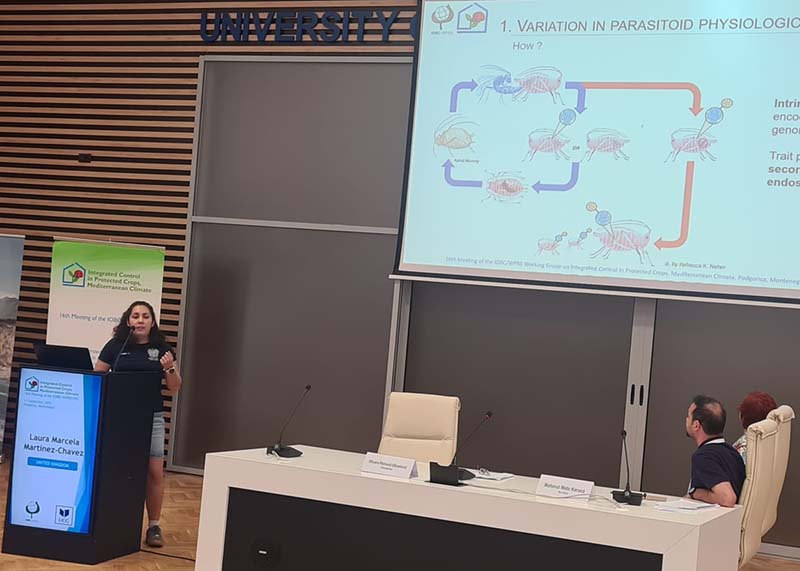The David Miller Travel Bursary Award aims to give early career plant scientists or horticulturists the opportunity of travel in connection with their horticultural careers. Laura Chavez was awarded one of the 2025 David Miller Travel Bursaries to attend the "16th Meeting of the IOBC-WPRS Working Group" in Montenegro. Read her report below.
"Between 1st to 7th of September 2025, I was able to attend the 16th Meeting of the IOBC-WPRS Working Group "integrated control in protected crops, mediterranean climate" held in Podgorica, Montenegro, thanks to the David Miller Travel Bursary award. Organised in cooperation with the Biotechnical Faculty of the University of Montenegro, this conference addressed the theme of “Promoting Integrated Pest Management in Protected Crops in a Changing Europe and Mediterranean Basin”. The meeting provided essential updates in key topics related to IPM in protected crops with a special emphasis in horticulture including: pests, natural enemies, techniques to improve biological control, biopesticides and biostimulants, plant and pest microbiomes and strategies for implementing conservation biological control. The scientific programme was supported by its wonderful location on a country known for its stunning natural beauty and rich cultural heritage.
"This conference was the last time I presented my PhD research as an oral presentation at an international event, which provided an incredible opportunity for networking and future collaboration opportunities. For my PhD I have studied the role of the potato aphid Macrosiphum euphorbiae intraspecific variation and its implications for the success of biological control when using the parasitoid Aphidius ervi in strawberry crops. Aphid damage is estimated to cost soft fruit growers at least 1% of the marketed value of crops annually, with the aphid species thought to have the greatest economic impact as pests of strawberry being Macrosiphum euphorbiae (the potato aphid), Chaetosiphon fragaefolii (the strawberry aphid) and Aphis gossypii (the cotton-and-melon aphid). Difficulties in the control of potato aphid have been reported in the United Kingdom by different stakeholders in the last five years, especially since the withdrawal of some chemical insecticides. Although different hypotheses have been proposed as the cause of this problem, no significant results have been achieved so far. Aphids can develop resistance to parasitoids via mutation in their genomes (i.e intrinsic resistance) or infection with facultative bacteria. My research focuses on testing the hypothesis that intraspecific variation in potato aphid (including intrinsic genetic differences and the infection with bacteria) could be linked to variation in susceptibility to A. ervi via physiological resistance and behavioural changes, which could be the disruptive cause of this pest’s management.

Laura presenting at the meeting
"The opportunity to attend and present at this IOBC meeting proved essential in sharing my findings with the international community currently working on supporting and developing new strategies for the control of pests. This not only focused on aphids but also on other pests that could potentially develop parasitoid resistance due to the increase in natural enemies’ use and the lack of understanding on the complexity of the pest-parasitoid interaction. In addition to this I had the opportunity to gain essential knowledge on current developments happening in the field in other areas of Europe. Some of the highlights of the conference included meeting Željko Tomanović an expert in parasitoids with over 30 years of experience in basic research (diversity, taxonomy, phylogenetics and ecology of insect parasitoids) and applied research (parasitoid–host interactions, biological control and monitoring of pests and invasive species) and is referenced worldwide in the world of parasitoid research. I also particularly enjoyed the talk focusing on using multi-target gene silencing via nanoparticle-delivered dsRNA as an efficient approach for aphid management, which could be applied to British strawberry crops. But also, other talks discussing how to manage the complexity of deploying microbial and macrobial biocontrol agents against pest species in an IPM context were insightful. Interesting discussions also arose with colleagues from industry and academia on the future approaches to improve the efficacy of parasitoids as biological control agents with representatives of different commercial suppliers including Biobest, Agrobio, Koppert and Bioline.
"I very much enjoyed not only having the opportunity to meet other researchers from all over the world including Japan and Chile but also having the chance to interact with them in both a scientific and social setting. As the conference not only included a full day technical excursion in which we were able to visit different protected crops and discussed concerns related to pest control with their owners and managers, but also three social events: a walking tour of Podgorica, a visit to a world-wide renewed wine-cellar where we had a four course lunch paired with wine tasting and a conference dinner framed in a cultural Montenegrin display. Overall, it was a great chance to learn about the history of Montenegro and to experience a completely different culture.
"My time in Montenegro passed too fast for my liking as I truly had a fantastic time. I came back to the United Kingdom with expanded knowledge and new research ideas that will provide useful soon as I embark in my post-PhD stage. I would like to thank again the SCI Horticulture group for selecting me to receive the David Miller Travel Bursary to support my attendance at this amazing conference and my career development."
Laura Marcela Martinez Chavez
PhD student
Harper Adams University, Entomology Group
